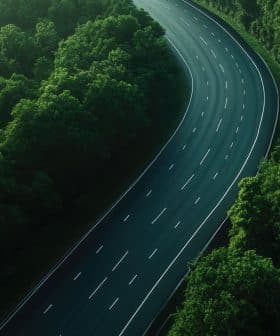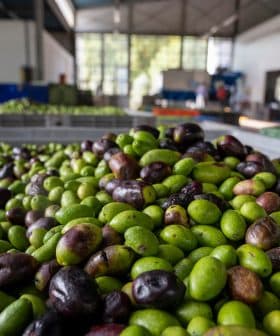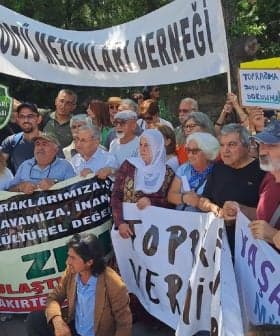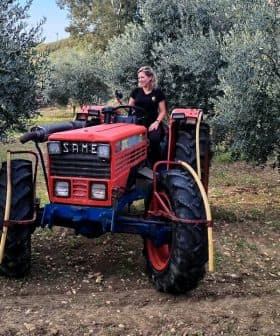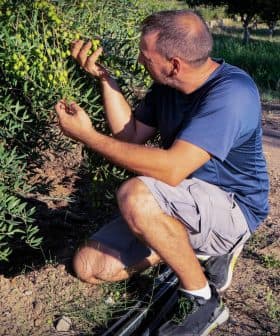Olive Groves and 'Fracking'
The biggest threat to olive groves is fracking, a technique used to extract natural gas that poses serious risks to aquifers in the province of Jaén. If wells are drilled in the area, pollution could spread to the aquifer, the Guadalimar river, and other important water sources, leading to environmental and economic consequences for the region. Efforts by agrarian organizations and affected towns to declare themselves “fracking free” are being made to prevent the potential harm caused by this technique.

Our olive groves have one scare after another. Turns out that the major threat to olive groves is not the expansion of Chinese crops, the Moroccan production, the low prices or the Reform of the Common Agricultural Policy (CAP).
The biggest problem can already be seen in the horizon and it is much more serious than the ones mentioned above. This threat is the fracking — also called hydraulic fracturing. We better get used to the name and to the name of the company behind it: Oil & Gas Capital, Ltd.
This technique is based on the extraction of natural gas by the drilling of a well, first vertically and then with turns and continuing horizontally. A mix of water and sand is pumped into the well at high pressure together with almost 400 different chemicals. These wells reach depths of around 2,000 and 3,000 meters but they could even reach 5,000 meters below ground.
The slate breaks and allows the release of natural gas. According to a report of the European Parliament, among the substances that are injected we can find toxic, allergenic, mutagenic and carcinogenic substances — damaging releases that the companies have done their utmost to not have to declare them.
Visit NBCNews.com for breaking news, world news, and news about the economy
So, how does this affect the olive groves?
Oil & Gas Capital has applied for, and been granted, many permits for the exploitation of gas in the province of Jaén by means of this technique.
I will focus on the case of the Jurassic aquifer of Úbeda, a huge carbonated and highly fractured aquifer that meets the requirements for bearing the brunt of all the negative impacts this technique can cause.
The aquifer of Úbeda is a prime example of this situation, which may be extended to aquifers all around the province, and that will affect the main production areas of the province — some of the most important municipalities like Úbeda, Baeza and Villacarrillo.
The area of Úbeda sits over a huge aquifer which covers about 20,000 square kilometers. This aquifer, where there are around 300 wells, irrigates 20.000 hectares of olive groves. There is also another small aquifer over it that recharges the aquifer of Úbeda and which is connected to it due to the huge amount of drilled wells.
Oil & Gas Capital has applied for a range of permits in the province. Two of them — the Ulises 2, which is in force, and the Himicle 3, for which the company has applied— will effect the aquifer in its south-western end.
If wells are drilled in this area by means of this fracking technique, the aquifer may be seriously harmed. Depending on the flow directions of the aquifer, these areas may become polluted:
- The aquifer itself, that taking into account both confined and unconfined parts amounts to 880 km²
- The Guadalimar river, which is linked to the aquifer and a natural water discharge
- The Giribaile reservoir that collects water from the Guadalimar river and is in direct contact with the aquifer
- The Lower Guadalquivir, as the Guadalimar river is its main tributary
- The carbonated surface of the area of Beas de Segura — as according to many, it may be connected to the aquifer
- The Miocene aquifer of Úbeda on the exploration surface and connected through wells with the deeper carbonated aquifer
.
Aquifer Pollution
The pollution of the aquifer would be more likely due to its high permeability, the intense fracturing it is subjected to and its great depth. The deepest well is 770 meters depth.
In addition, the latest research carried out through seismic, mechanical and vertical electric explorations locate a range of strike-slip faults around 30 and 100 meters deep that affect the aquifer and its underlying unit which may reach the depth where fracking exploitation is expected to take place.
These faults may connect the highly polluted exploitation area to the aquifer and, at the same time, the aquifer itself connects to the Guadalimar river, the Miocene aquifer of Úbeda and even to the aquifer of the Natural Park.
Seismicity
Another harmful effect may be the increase of the seismic activity of the area. There are 3 main faults, apart from those of smaller sizes. These faults affect the deeper materials and, as a consequence of the lubrication originated by the fluid injection, the faults may reactivate.
In addition, seismicity may also increase due to these injections, the hydraulic fracking and the explosions, in addition to the sharp changes of water levels.
Current experts think that among earthquake possible triggering causes an important factor to take into consideration is the action of water — both in the aquifer and in its underlying and overlying units. This water may cause new fractures or the reactivation of faults.
Another effect that may increase the seismicity in the area would be the dissolution of a vast quantity of evaporites from the geological unit existing under the aquifer. This is due to the contribution of a huge amount of water for exploitation which may go through the fractures from the lower levels and that may cause collapses or diapir movements which would intensify the number of earthquakes.
Difficulties
We will find pollution spreading across a great part of the province due to both surface and ground water pollution.
We could hardly publicize our olive groves and olive oil as a great product if our land is irrigated with highly polluted waters.
Also the Natural Park of Cazorla, Segura and las Villas would be harmed if this pollution reaches it, as well as the slogan of the province “Jaén, paraíso interior” (“Jaén, inner paradise”)
Not even the generation of much-needed employment is a valid pretext since the average life expectancy of the wells is around 5 or 6, and the companies exploiting them would presumably hire workers already trained in Texas or Oklahoma, for example. This situation will end up with an area useless for its originals purposes.
I would like to encourage this sector to do some research on the topic and on this fast-coming threat which some agrarian organizations, such as UPA (small-scale livestock owners and farmers’ association) or COAG (coordinator of livestock owners and farmer’s associations), have already reported. Moreover I also want to encourage the affected towns to follow the lead of Torreperogil and declare themselves as “fracking free towns.”
Repsol Investigaciones petrolíferas S.A. has ceased the permit it had applied for due to the allegations made by the House of Alba for harming their interests. However, the local government of Úbeda, town which will have their ground water affected, has belittled declaring the town as “Fracking free” because of the votes from the two largest parties.
I hope they will realize their own mistake and that our tree, which is the sacred tree of Athena, triumphs once more and that our politicians will not follow the siren’s songs. Our future depends on it.


